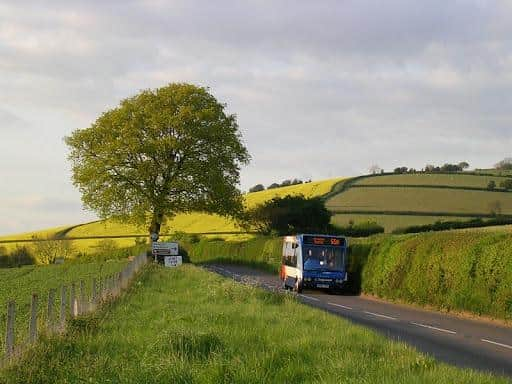Moorsbus services in North York Moors to be cut unless funding can be found
Hours before the Yorkshire Dales National Park announced it was set to press North Yorkshire Council and other local authorities for urgent action to ramp up trains and buses, members of the North York Moors National Park Authority were told many Moorsbus services would be cut unless extra funding could be found.
A growing number of members of both national park authorities believe it is incumbent on them to directly or indirectly intervene in the provision of public transport across the areas, saying the services are vital for communities, tourism and cutting carbon emissions.
Advertisement
Hide AdAdvertisement
Hide AdA meeting of the Moors authority in Helmsley heard the community interest company which has run several Moorsbus services from the towns surrounding the national park in recent years was facing a cash crisis and running a “very minimal timetable”.


Authority member John Ritchie told the meeting the loss of Moorbus services threatened the authority’s key ambitions. He said: “It strikes me that Moorsbus is in a very precarious position and many communities rely on that service. It would be a crying shame to see it being reduced.”
The authority’s chairman Jim Bailey added Moorsbus’ funding appeal related to “a massive part of what we do”, in terms of the authority’s second purpose to attract visitors, helping improve people’s health and wellbeing and improving the environment. He said the authority’s officers would examine the Moorsbus appeal in the coming weeks.
Directors of Moorbus said they held a “crisis meeting” after realising with just £18,000 in its account for the coming year it would only be able to run a skeleton service over a restricted number of months partly due to inflationary pressures and difficulty fundraising during the cost of living crisis.
Advertisement
Hide AdAdvertisement
Hide AdOne director, Eden Blyth, said: “Unless more funding becomes available we running a very limited service, although we haven’t decided what that’s going to be, which compared with the three-days-a-week service we ran over five months pre-Covid will come as a bit of blow to our passengers.”
The appeal follows campaigner Colin Speakman, a trustee of the North Yorkshire Moors Association and vice president of Friends of the Dales, accusing both national park authorities of regarding public transport as “one of their lowest priorities”.
However, a meeting of the Yorkshire Dales authority next Tuesday (March 28) is expected to see its members press North Yorkshire Council and other local authorities to help oversee a “significant increase” in bus service coverage and frequency across the area, as well as improved coordination between bus and rail operators.
In November, North Yorkshire transport boss Councillor Keane Duncan has underlined how the county’s existing bus network was “facing a really grave situation”, in a year which has also seen the government completely reject the authority’s £116m plan to revive public transport.
Advertisement
Hide AdAdvertisement
Hide AdIn addition, instead of considering reviving bus services axed during austering the incoming unitary authority is looking to have to find £69m of savings over the next four years.
Since among the country’s most severe cutbacks in public transport funding during austerity, the county council has ploughed £1.6m annually into subsidising scores of bus services.
Despite this, the Dales authority is set to call for measures to increase bus and rail travel, more evenly spaced services and increased capacity for cycles on trains. It says of the five million visitors to the national park a year, only four per cent travel by bus or coach and two per cent by train.
Both park authorities have adopted the county council-approved Local Enterprise Partnership’s Route Map to Carbon Negative, which included an ambition to reduce private car usage by 48 per cent by 2030 and increase the use of buses and trains.
Advertisement
Hide AdAdvertisement
Hide AdThe Dales authority’s member champion for the natural environment Mark Corner said it was becoming increasingly clear for climate mitigation and accessibility, councils needed “to bring about a situation where people use cars less and public transport more”.
